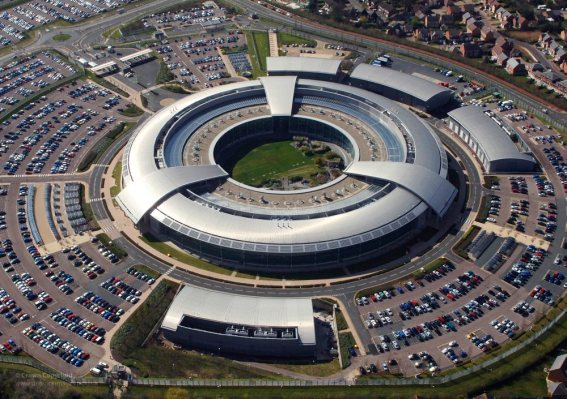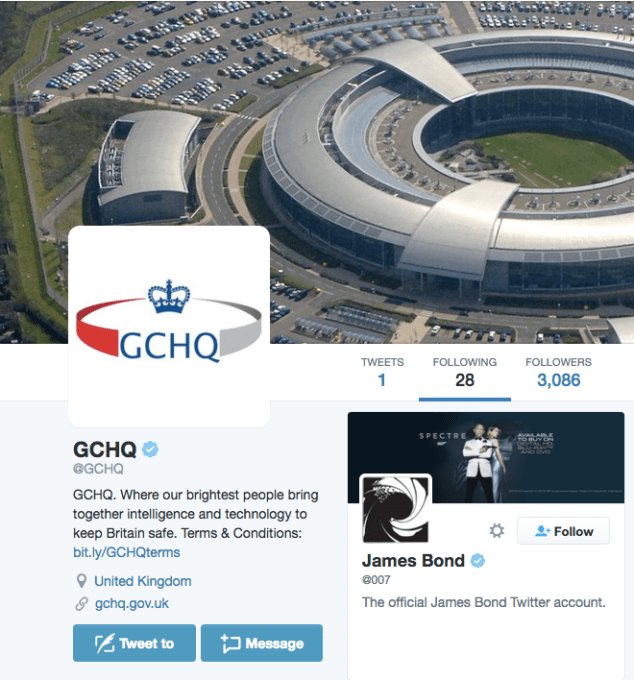It’s a sign of our massively surveilled times that spy agencies have realized the importance of maintaining an approachable public face in the digital realm where they now derive so much of their signal noise.
GCHQ, the UK spy agency which specializes in garnering intelligence from communications (as opposed to, MI5 and MI6, which focus on acquiring domestic and foreign “human intelligence”, respectively) has officially joined Twitter — posting a “Hello, world” inaugural tweet from its blue check verified account.
It’s the first of the UK’s three agencies to start tweeting.
In an accompanying press release, the agency says:
We want GCHQ to be more accessible and to help the public understand more about our work. We also want to reach out to the technical community and add our voice to social media conversations about technology, maths, cyber security, and other topics where we have a view.
We will be using Twitter to talk about our history, mission outcomes, languages, maths, cyber security, technology and innovation, job opportunities and as a way of signposting events, publications, news, blogs, and opinion pieces.
Since NSA whistleblower Edward Snowden revealed the extent of secret government mass surveillance programs, back in 2013, including how they plug into consumer digital services to harvest massive volumes of data on web users, spy agencies have clearly decided they need to up their PR game as a strategy to tackle greater levels of public scrutiny being applied to what were previously very shadowy processes.
Lurking in the shadows after you’ve been judged to be involved in illegal cross-border data-sharing activities, for example — especially when the government is in the process of updating the legislation that governs your operations — isn’t quite so viable as it was, back when security agencies leveraged obscure clauses in outdated laws to amass vast quantities of data on citizens who are not suspected of any crimes without proper parliamentary or public oversight. Because who can scrutinize what they don’t know about or fully understand?
Joining Twitter is just the latest post-Snowden PR move from UK spy agencies. Back in September, for example, the chief of MI5 did a live broadcast interview on BBC Radio’s The Today program — the first time a standing head of any of the UK’s intelligence services had done so — in which he urged technology companies to do more to help security agencies by pro-actively handing over intel on their users. So applying political pressure on tech platforms is another branch of the strategy here.
The Snowden disclosures have certainly forced more public debate of state investigatory powers globally, although it is debatable how robust this debate is able to be given the ongoing obfuscation and contradiction from governments and agencies around key issues such as the legality of encryption.
But one thing we are certainly getting is a perception of increased openness as spy agency burnish their public image by doing things like opening up official social media accounts. Hello world indeed.
If you wanted a little proof of GCHQ’s social media fueled PR agenda you need look no further than the fact one of the (currently) 28 other accounts the official GCHQ Twitter account is following is the official account of the fictional British spy James Bond….
Clearly the glitzy Bond movie franchise continues to be a cornerstone of the UK spy agencies’ win-the-public’s-hearts-and-minds strategy.
And no, GCHQ is not (yet) following @Snowden — who popped up officially on Twitter back in September last year to provide a public counter-narrative to state mass surveillance spin.
Joining social media is also likely to be part of the agency’s outreach attempts to attract new recruits from different demographics that might be more comfortable communicating on social media. Last November, giving a speech at GCHQ, UK chancellor George Osborne announced a plan to double government spending on cyber security — including adding 1,900 new staff across the three intelligence agencies.

